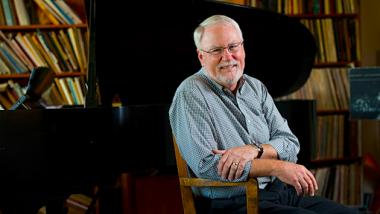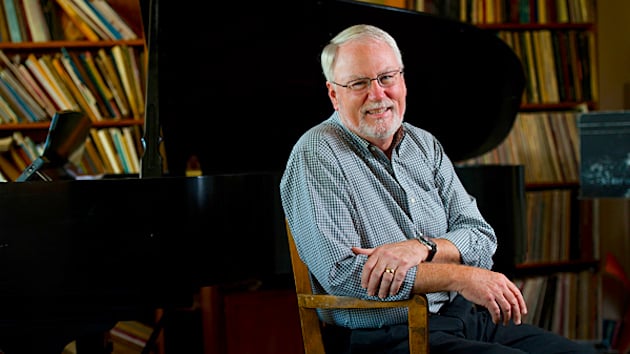
Even against the humongous landscape of what Chorus America cites as 24 million adults in some 250,000 choruses, Schola Cantorum stands out with longevity and a sterling record.
As it begins the 55th season (“rebranded” as Schola Cantorum Silicon Valley since last year) with three Bach cantatas on Nov. 3, the chorus also celebrates another milestone: the 30th and final season under the leadership of Gregory Wait.
Wait, the Billie Bennett Achilles Director of Vocal Studies at Stanford University, started his career conducting church and community choirs in the 1970s. At Stanford since 1979, he conducted the Memorial Church Choir, then added the Congregational Oratorio Society in 1985, and Schola Cantorum in 1989.
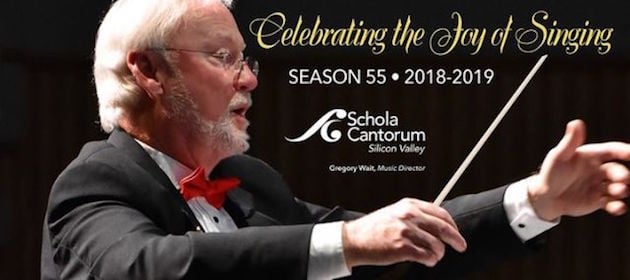
He has selected a varied and ambitious program for his farewell season: the opening all-Bach concert, “A John Rutter Christmas,” Orff’s Carmina Burana, and Brahms’s German Requiem, which Wait calls his “favorite work of all time.”
The season also includes the annual “Messiah Sing,” on Dec. 17, in the Mountain View Center for the Performing Arts. There will be two sing-along events, where participants follow the lyrics projected on a screen: “And the Winner Is,” a selection of show tunes and movie hits on Nov. 11; and “You’re Just in Love,” on Feb. 10. Both are held in the Los Altos United Methodist Church.
The auditioned 80-voice chorus has engaged in such hugely ambitious projects under Wait’s direction as the St. Matthew Passion in Stanford Memorial Church, the Mozart Requiem commemorating the first and tenth anniversary of 9/11, Donald McCullough’s Holocaust Cantata, and many others.
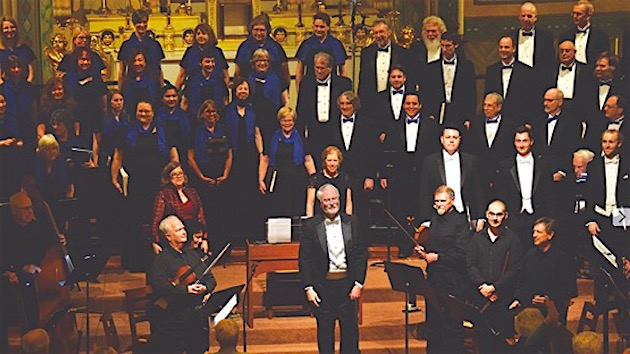
Performances are just part of Schola’s work — there are also educational outreach programs and collaborations with local artists and various organizations from the San Francisco Symphony to the Nuclear Whales Saxophone Orchestra.
The chorus has also commissioned new works, starting with Alva Henderson’s The Ancient Ones; over the years they have worked with Dirk Damonte, Joseph Jennings, Libby Larsen, Kirke Mechem, and Theodore Toews.
Wait is among choral conductors who don’t regard the singers as “his” — Schola, he says, is “owned by the singers and all of us. I want my final season to be about the music and Schola, and not so much about me. The joy and love that I have for music is in the doing of it every day, not in the applause or accolades.”
The challenge to the conductor, he says, has been “to treat a fairly large chorus as though it were a chamber choir. So, we put a premium on the sound and precision of the ensemble in repertoire ranging from Renaissance to contemporary, sacred and secular, musical theater, opera, Masses, passions, and so much more.”
Deborah Anderson, who has sung with Schola for 48 years, echoes Wait’s dedication and involvement:
I’ve been in the chorus since I was a 19-year-old Stanford student, and now I’m a grandmother of 12. Schola is unique with extremely high quality, but it also has a very family-oriented feel to it. That’s been the case with all of the conductors, but very much so with Greg.
After a successful career as a professional tenor soloist, Greg is in high demand as a voice teacher. He works high caliber voice lessons into our rehearsals, which has made us a far better chorus under his leadership. But he does it so deftly, we’re not always aware it’s happening.
Wait’s history with Schola goes back to singing with the chorus under the direction of Louis Magor, who followed the founder, Royal Stanton. (Claire Giovannetti conducted an interim year.) Wait also sang the tenor arias in the Bach St. John Passion and soloed as the roasting swan in Carmina Burana.
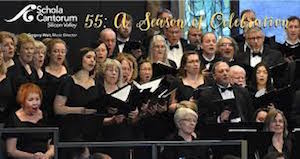
Hanna especially appreciates the combination of support and challenge from Wait. “We’re professional people, not professional musicians. But Greg is able to hit exactly the right note (pun intended) for the forces he commands, and the result is, he gets the best out of every group, every time.”
He is retiring, Wait says, because “it’s time for new energy, new direction” for Schola, and for himself: “There are things I want to do on Monday nights and Sunday mornings while I’m still mobile.” And mobile he is, planning “to travel with my spouse, garden, cook, attend events such as concerts, plays, exhibits, and read for pleasure. Our son lives in eastern Pennsylvania, so we bought a house and plan on visiting him and his future bride — using that as a base for explorations of the East Coast.”

